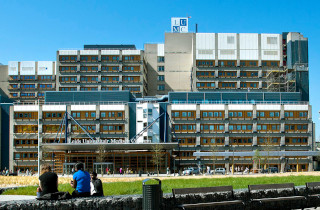Postdoc Bioinformatician m/f
Postdoc Bioinformatician m/f
You cannot apply for this job anymore (deadline was 1 Apr 2018).
Browse the current job offers or choose an item in the top navigation above.
Job description
As postdoc bioinformatician, you will work within the Molecular Tumor Genetics group in the Department of Pathology on the research program Bone and Soft Tissue Tumors. The program focuses on elucidating the molecular events underlying sarcoma development and progression with an aim to improving diagnosis, prognosis and treatment for patients with bone and soft tissue tumors. As Bioinformatician, you will be involved in the design and data analysis of transcriptome and exome/genome sequencing of different preclinical models, using established bioinformatics approaches such as limma+voom and gene set enrichment analysis. In addition you will use innovative computational tools to reconstruct regulatory networks. The aim is to identify canonical pathways affected by the genes of interest and to identify existing compounds that may interfere with these pathways. These compounds will subsequently be tested in the preclinical models as well as in 3D tumor models by the PhD students working within the VICI program. You will be expected to do an initial two to three month fellowship at the Dana Farber Cancer Institute at Harvard University to learn the innovative tools for network analysis.
Specifications
- max. 36 hours per week
- max. €4216 per month
- Leiden View on Google Maps
Requirements
You have a PhD in Bioinformatics, Computational Biology, Cancer Genomics or similar subject, and have an affinity with cell biology, preferably in the field of oncology. Good analytical skills are essential as is proficiency in at least one programming language. You must be fluent in English, performance driven, structured and accurate and have good communication and writing skills.
Conditions of employment
Fixed-term contract: three years.
You will be employed on the basis of a 36-hour week. Appointment is for three years. The salary will depend on your qualifications and experience, with a maximum of € 4,216 gross per month based on a full time position (scale 10 of the Collective Labor Agreement for University Hospitals).
The terms of employment offered by the LUMC are highly favorable. For example, you will receive 8% holiday remuneration, a year-end bonus, and a pension arrangement with the National Civil Pension Fund. Also, as employee of one of the University Hospitals in the Netherlands, you can benefit from our collective health insurance policy.
Moreover, the LUMC offers excellent facilities in the area of education, child-care centers, and career advice. In addition, you may enjoy various leave arrangements and other extras. You can read more about these facilities elsewhere on this site.
Employer
Working at the LUMC
The LUMC is a center for medical innovation that aims to improve patient care through leading international research. So as to also provide our patients with a safe and friendly environment, we need doctors, medical care specialists, support staff and academic researchers.
Within the Department of Pathology, the research group bone and soft tissue tumor pathology is led by Professor Judith V.M.G. Bovée. The research program is embedded within the LUMC profile area “Cancer Pathogenesis and Therapy”, and the LUMC is recognized as a center of expertise for bone and soft tissue tumors. The department of Pathology collaborates closely with the departments of Orthopedic Surgery, Radiology, Cell & Chemical Biology, Endocrinology and Human and Clinical Genetics, and has hosted the Netherlands Committee on Bone Tumors for the past 53 years.
Department
Pathology
Sarcomas are rare cancers arising in soft tissue and bone. They are difficult to diagnose and treat, and there is a 38-48% mortality rate for this often young age group. It is now generally accepted that molecular changes in cancer opens avenues for personalized medicine, but in the case of sarcomas, representative model systems are scarce. This VICI program “sarcoma modelling towards patient specific treatment” aims to generate representative sarcoma models for gene manipulation and preclinical testing of existing drugs. More specifically, preclinical models will be generated using the presumed cell of origin for gene editing. The group is involved in several European Committee granted networks (see for instance www.euroewing.eu, www.eurosarc.eu) all of which focus on the pathology, biology and genetics of bone and soft tissue tumors. As a result, the project is part of an international collaboration exchanging technology and skills between leading institutes in tumor genetics across Europe. A well-established, tested pipeline to analyze transcriptome sequencing data is available at the LUMC Sequence Analysis Support Core (SASC) (https://humgenprojects.lumc.nl/sasc/) to support the bioinformatician. The project is a collaboration with Dr. M. Kuijjer, Dana Farber Cancer Institute (DFCI), Harvard University, Boston, and she will co-supervise the bioinformatic analysis.
Specifications
- Postdoc
- Health
- max. 36 hours per week
- max. €4216 per month
- University graduate
- C.18.AP.MP.02
:fill(white)/logos/lumc-en-wide.png)
